- Home
- C. C. Humphreys
Vlad: The Last Confession
Vlad: The Last Confession Read online
DRACULA. A name of horror, depravity, and the darkest sensuality.
Yet the real Dracula was just as alluring, just as terrifying, his story not of a monster but of a man…and a contradiction. For the one they called “The Devil’s Son” was both tyrant and lawgiver, crusader and mass slaughterer, torturer and hero, lover and murderer.
His tale is told by those who knew him best. The only woman he ever loved and whom he has to sacrifice. His closest comrade and traitor. And his priest, betraying the secrets of the confessional to reveal the mind of the man history would forever remember as Tepes—“The Impaler.”
But Vlad’s actions defy such labels. His extraordinary life burns with passion, taking him from his years as hostage to the Turk, through torture, battle, triumph, and betrayal, ultimately to a last crusade—there perhaps, beneath the twin banners of the Dragon and the Cross, to find redemption for his innumerable sins.
Copyright
Copyright © 2009, 2011 by C.C. Humphreys
Cover design © Orion Publishing Group Limited
Internal design © 2011 by Sourcebooks, Inc.
Sourcebooks and the colophon are registered trademarks of Sourcebooks, Inc.
All rights reserved. No part of this book may be reproduced in any form or by any electronic or mechanical means including information storage and retrieval systems—except in the case of brief quotations embodied in critical articles or reviews—without permission in writing from its publisher, Sourcebooks, Inc.
The characters and events portrayed in this book are fictitious and used fictitiously. Apart from well-known historical figures, any similarity to real persons, living or dead, is purely coincidental and not intended by the author.
Published by Sourcebooks Landmark, an imprint of Sourcebooks, Inc.
P.O. Box 4410, Naperville, Illinois 60567-4410
(630) 961-3900
Fax: (630) 961-2168
www.sourcebooks.com
Originally published in London in 2009 by Orion Books.
Library of Congress Cataloging-in-Publication Data
Humphreys, C. C. (Chris C.)
Vlad : the last confession / C.C. Humphreys.
p. cm.
“Originally published in London in 2009 by Orion Books”—T.p. verso.
Includes bibliographical references.
1. Vlad III, Prince of Wallachia, 1430 or 31-1476 or 7—Fiction. 2. Wallachia—Kings and rulers—Fiction. 3. Wallachia—History—Fiction. I. Title.
PR9199.4.H85V53 2011
813’.6—dc22
2010050908
CONTENTS
FRONT COVER
TITLE PAGE
COPYRIGHT
DRAMATIS PERSONAE
TO THE READER…
PROLOGUE
I
II
III
PART ONE
ONE
TWO
THREE
FOUR
FIVE
SIX
SEVEN
EIGHT
NINE
TEN
ELEVEN
TWELVE
THIRTEEN
FOURTEEN
FIFTEEN
SIXTEEN
SEVENTEEN
EIGHTEEN
NINETEEN
PART TWO
TWENTY
TWENTY-ONE
TWENTY-TWO
TWENTY-THREE
TWENTY-FOUR
TWENTY-FIVE
TWENTY-SIX
TWENTY-SEVEN
PART THREE
TWENTY-EIGHT
TWENTY-NINE
THIRTY
THIRTY-ONE
THIRTY-TWO
THIRTY-THREE
THIRTY-FOUR
THIRTY-FIVE
THIRTY-SIX
THIRTY-SEVEN
THIRTY-EIGHT
THIRTY-NINE
FORTY
FORTY-ONE
FORTY-TWO
FORTY-THREE
PART FOUR
FORTY-FOUR
FORTY-FIVE
FORTY-SIX
FORTY-SEVEN
FORTY-EIGHT
FORTY-NINE
FIFTY
FIFTY-ONE
FIFTY-TWO
EPILOGUE
AUTHOR’S NOTE
BIBLIOGRAPHY
GLOSSARY
ABOUT THE AUTHOR
BACK COVER
To Alma Lee, lady of letters, adviser and inspiration.
In memory of Kate Jones, the very best of literary agents, and of friends. Sorely missed.
DRAMATIS PERSONAE
. . . . . . . . . . . . . . . . . . . . .
THE DRACULESTI
Vlad Dracul—“The Dragon”
The Dragon’s Sons:
Mircea Dracula
Vlad Dracula
Radu Dracula
. . . . . . . . . . . . . . . . . . . . .
THE WITNESSES
Ion Tremblac
Ilona Ferenc
Brother Vasilie, the Hermit
. . . . . . . . . . . . . . . . . . . . .
HEARING THE LAST CONFESSION
Petru Iordache, Spatar of Poenari Castle
Janos Horvathy, Count of Pecs
Cardinal Domenico Grimani, Papal Legate
. . . . . . . . . . . . . . . . . . . . .
AT THE TURKISH COURT
Hamza agha, later Hamza pasha
Murad Han, Sultan of Rum
His son, Mehmet Celebi, soon to be “Fatih” or “The Conqueror”
Abdulraschid, his favorite
Hibah, mistress of concubines
Tarub, maid
Abdulkarim, or Sweyn the Swede, janissary
. . . . . . . . . . . . . . . . . . . . .
THE HOSTAGES AT EDIRNE
The Mardic Brothers, Serbian
Constantin, Bosnian
Zoran, Croatian
Petre, Transylvanian
. . . . . . . . . . . . . . . . . . . . .
AT TOKAT
Abdul-Mahir, torturer
Wadi, torturer
Samuil, the Christian martyr
. . . . . . . . . . . . . . . . . . . . .
THE WALLACHIAN BOYARS
Albu “cel Mare” (“The Great”)
Udriste
Codrea, vornic (judge)
Turcul
Gales
Buriu, spatar, commander of cavalry
Dobrita
Cazan, Dracul’s logofat, or chancellor
The Metropolitan, head of the Orthodox Church in Wallachia
. . . . . . . . . . . . . . . . . . . . .
DRACULA’S VITESJI
Black Ilie
Laughing Gregor
Stoica the Silent
. . . . . . . . . . . . . . . . . . . . .
PRETENDERS TO THE WALLACHIAN THRONE
Vladislav Dan
Basarab Laiota
. . . . . . . . . . . . . . . . . . . . .
OTHERS
Matthew Corvinus, “the Crow,” King of Hungary
Brother Vasilie, Vlad’s confessor
Thomas Catavolinos, Ambassador
Abdulmunsif, Ambassador
Abdulaziz, Ambassador
Mihailoglu Ali Bey, Radu’s army commander
Jan Jiskra, Corvinus’s mercenary commander
Elisabeta, Dracula’s first wife
Vlad, Dracula’s son
Ilona Szilagy, Dracula’s second wife
Janos Varency, thief-taker
Roman, Moldavian
Old Kristo, gatekeeper
Hekim Yakub, physician
TO THE READER…
In the bitter winter of 1431, in the town of Sighisoara, a second son was born t
o Vlad Dracul, Voivode (or Warlord) of Transylvania. He was christened Vlad and, like his elder brother, was given the surname Dracul-a—Son of Dracul.
In the “limba Romana” that they spoke “Dracul” meant “the Dragon.” Or “the Devil.” So Vlad Dracula was the Devil’s Son.
He acquired other titles in his life. Voivode of Ungro-Wallachia. Lord of Amlas and Fagaras. Brother of the secret “fraternatis draconem”—the Order of the Dragon. His own people called him Vlad Tepes. His Turkish enemies called him Kaziklu Bey. Both meant—The Impaler.
The land he won and lost and ruled was Wallachia, the central province of present-day Romania. Caught between the expanding Hungarian Kingdom and the all-conquering Turks, between the Crescent and the Cross, Wallachian princes were expected to be the dutiful vassal of one or the other.
Dracula had different ideas. Different ways of executing them.
Finally killed in battle in 1476, his head was chopped off and sent as a gift to his most bitter foe, Mehmet, Sultan of the Turks. It was mounted upon a stake on the walls of Constantinople. There it rotted.
A few mourned him; most did not.
I make no judgement. I leave that to those who heard his last confession—and, of course, to you, the Reader.
I am a man. Nothing human is alien to me.
Terence
– PROLOGUE –
Confession
Have you committed a sin? Then enter the Church and repent your sin. For here is the physician, not the judge: here one is not investigated but receives remission of sins.
—ST JOHN CHRYSOSTOM
– I –
The Summons
Wallachia, March 1481
All was still in the forest. The last snowflakes of the sudden storm had just fallen. Everything paused.
In the crook of a copper beech sat a man. His arms were crossed, gloved hands folded into his lap, the right beneath to support the weight of the goshawk on his left. They had been there for a long time, as long as the blizzard lasted. Man and bird—part of the stillness, part of the silence. Both had their eyes closed. Neither were asleep.
They were waiting for the first sound. Something else to recognize that the storm had passed, be the first to stir before the next one arrived.
There. A twitch of nostrils, their pinkness the only color in a white world. A sniff—the first sound, followed by the faintest of breezes coming up the valley. The hare could not scent those behind her.
It was hardly a sound—but the man and the hawk both opened their eyes. The bird’s were red, fire-red, hell-red, because she was old, nine years old, five past her prime when she could take ten hares, a half-dozen squirrels, a brace of stoats all in a day. Not for their flesh, she didn’t need so much. Not for the skins that clothed the man on whose fist she sat. For the pure pleasure of the kill.
Four eyes stared at the snow pack in the glade, seeking the source of the sound they couldn’t have heard.
The hare pushed her whole head above the snow-crust. When the blizzard came, she had been caught between stands of beech and aspen, digging for a root. Surprised by the sudden white ferocity, she had frozen. The new snow was as deep as her body but her rear legs rested on the hard pack beneath. Shelter was just twenty leaps away. There, among the deadfalls, she would be safe.
In the tree, the man raised his fist, a wall of soft snow tumbling from his arm, thunder in the silence.
The hare leapt. Young, fast, she was halfway to safety when the man flung out his arm and the bird fell from the tree. Five beats and into its glide. The hare wove, so winter-lean that in the shallower snow near the tree line she skimmed the soft surface. Before it, a fallen branch made an arch, like a cathedral’s porch.
The hawk struck, talons thrusting through fur, into flesh. The hare twisted, ripping one triumvirate of claws free, a spray of blood following, a red arrowhead pointing towards darkness and the sanctuary of wood.
Then the jerking stopped and all was still in the forest again.
The man dropped carefully from the tree, groaned, despite the softness he fell into. Snow tumbled from his coat, from its alternating stripes of hare, squirrel, and weasel, from the pyramid of wolf-skin on his head. He moved slowly forward, brushing the dirty white beard that curled thickly up to his cheekbones clear of ice.
Stooping, he wrapped his fingers around the bird’s back, pulled gently. Hawk and hare slid from the drift. The bird released instantly, her eyes fixed on the leather pouch at the man’s waist. With his free hand he reached in and pulled out a piece of fresh flesh. She took it, making a small noise in her throat.
The hare stared up, unblinking in terror. For a moment the man stared back. Then he moved his thumb slightly, pushed down and snapped the neck.
It made such a little sound. Too little for the snap that came a moment after to be an echo. He listened…and soon heard men trying not to be heard.
Another snap, this one from down the valley. More men there, and that told him. There was little game on this small mountain at the end of winter; these men were coming for him.
He was surprised they were coming now, through the new snow. But the blizzard had hit fast, winter’s late shock, so they must have set out before it began. There were only a few ways off the mountain and, if he knew them all, he assumed the men who hunted him did, too. They would spread like a net through the trees—soldiers and woodcutters and gypsies. They would have dogs…There. A short bark came from below, another responding from above, neck chains jerked too late to silence them.
He’d known they would come for him eventually.
Dropping the hare’s corpse into his pouch, he made his left hand into a fist. The hawk hopped onto it instantly, red eyes watching his.
“It is time,” he whispered.
She put her head slightly to one side, as if in question. But she knew as well as he. The blizzard had been an echo of winter only.
“Go,” he said, “Find a mate…”
He broke off. Every spring he’d let her go, then find her nest in the late summer, take her fledgling, train it, sell it to a dealer in the town for a dozen gold pieces, so prized was a broken-in bird. But this year? She was old, and perhaps would not mate. Besides, the men moving towards them from below, from above? Perhaps he would be the one who didn’t return.
“Go,” he said again, and flung out his arm.
Five beats and glide. Yet before she passed between two trees, and perhaps out of his life, she flipped briefly onto her back, as she would to take a pigeon. Her talons stretched, as if in salute. Then she was gone.
He closed his eyes, listened, then moved in the opposite direction to the hawk’s flight. Soon the trunks grew closer, branches twining overhead, and the snow was not so deep. He broke into a stumbling run.
Hunter had become the hunted. Now he was the one seeking sanctuary…
—
Mist rose. Despite the tapestries upon the walls, the sheepskins under her feet, winter still seeped into her cell. So the water in the tub sent its heat up into the chill and, where it met stone, turned to liquid. Drops joined, ran, and halted as ice.
She had removed all her clothes, save for her shift. Shivering, one foot on top of the other, she waited. The water was just off the boil, still almost unbearable to the touch. Yet it had to keep its heat, for she needed to lie in it a long time, for the easing of her pains, for her pleasure.
She thrust an arm in. It reddened but she could keep it there. It was almost time.
She uncorked a flask, tipped it carefully, watching the viscous liquid drip out. Two heartbeats, enough, the steam savoured now with camomile, with clary sage, with sandalwood. She closed her eyes, breathed, sighed. It was fresh, young, but it lacked something in the base. Oil of Bergamot, she thought. She wouldn’t be able to get any till the Turkish traders came to the Spring Fair. One month away.
She was shaking with cold now, yet still she waited. She’d been taught—long ago, by those who knew this well—that pleasure delay
ed was pleasure doubled. Yet she waited for another reason also. When she removed her shift, she would see her body once more. There were no mirrors in the convent. She, who used to stare at herself delightedly in the finest Venetian glass, had not looked in one in the nineteen years since she took Holy Orders. The body that princes once fought for had changed.
She shivered again, not only from the cold. It was the moment. The water, perfect. The mingled scent, perfect. Her body…as it was. She crossed her arms, gripped cloth at her broad hips, pulled it up, over. Looked.
A month before, in a village near Targoviste, a statue of the Virgin had blossomed stigmata. The wounds of Christ the Son appearing on Mary the Mother, on each of her palms, at her ankles, weeping blood. Thousands had come to marvel, from all over Wallachia, some even struggling across the passes from Transylvania, despite the hardest winter in anyone’s memory.
How many would come to see her wounds?
She lowered herself slowly into the tub, groaning at the exquisite pain. Finally she lay back and traced her fingertip along purple lines that stood proud of the reddening skin, aching with the sudden heat. Aching more with the memory of the man who gave them to her. Aching most when she recalled the other ways he touched her.
Water flooded her, penetrated her, released her, her wounds and her memories. Scent and heat made her mind slide, away from pain, to pleasure; thence to joy. Her orphans growing stronger with each day, just three lost to the winter, brought too late even for her care. The rest, all five, thriving. On her cot lay a plait woven of rosemary sprigs, that the littlest, Florica, had given her only that morning. It was threaded through with a lock of her wheaten hair. The child could spare it, had as much as she herself once had, before she married Christ.
She felt the hammering on the convent’s main door at the same time she heard it. Three strikes that traveled through stone, up wood, rippling the surface of the water. But she did not open her eyes. The Matins bell had called the novitiates to prayer some time before. No visitor would be admitted to the convent till dawn, however great their hurt.
Thump. Thump. Thump. Whoever it was did not use the iron knocker upon the wood. And then, recognizing the sound, she sat up. She had heard it once before, on the day the scars were made.

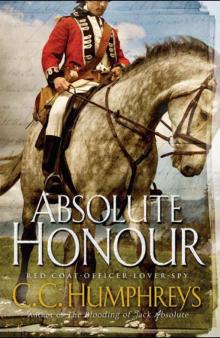 Absolute Honour
Absolute Honour Plague
Plague Blood Ties
Blood Ties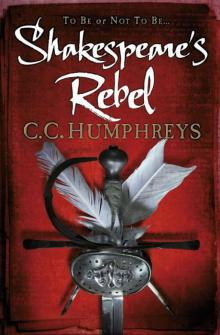 Shakespeare's Rebel
Shakespeare's Rebel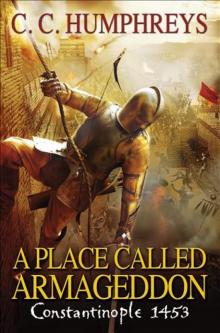 A Place Called Armageddon
A Place Called Armageddon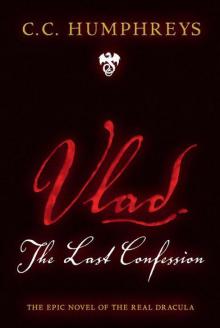 Vlad: The Last Confession
Vlad: The Last Confession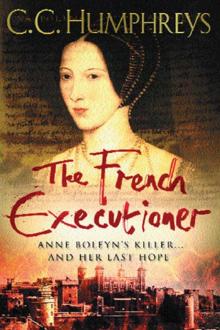 The French Executioner
The French Executioner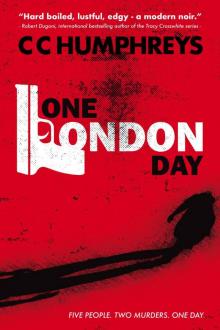 One London Day
One London Day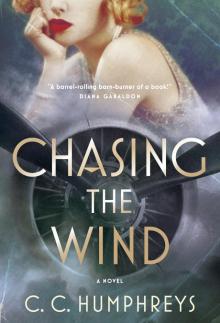 Chasing the Wind
Chasing the Wind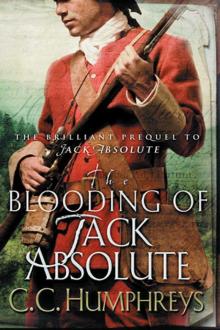 The Blooding of Jack Absolute
The Blooding of Jack Absolute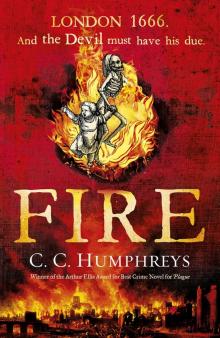 Fire
Fire